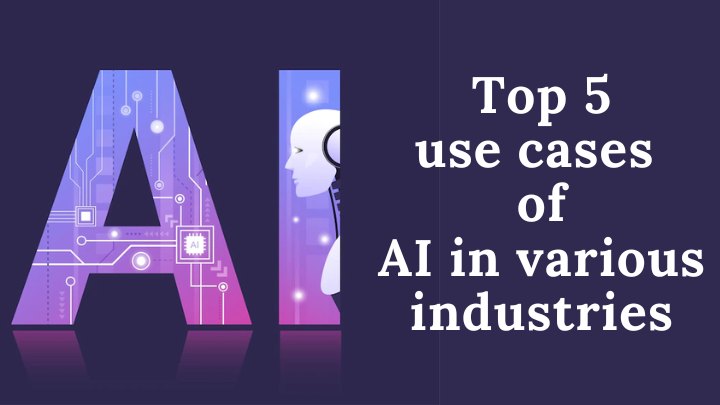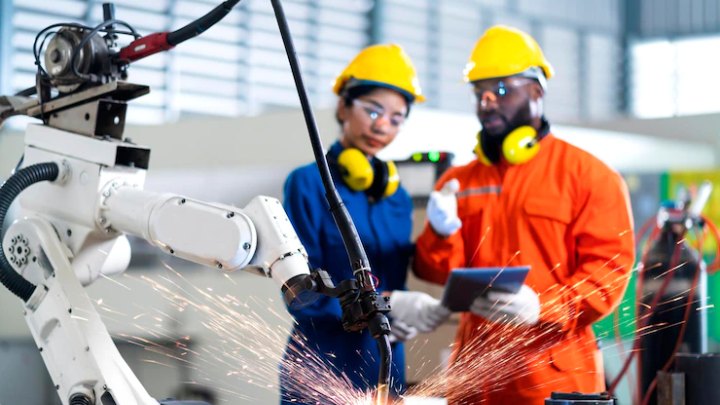
The majority of industries have utilized this AI (Artificial Intelligence) technology to predict the future. This is why the demand for Artificial Intelligence has shifted to being more focused on specific industries. For instance, “AI in Manufacturing” is the most popular search on Google. Let’s check the top 5 use cases of AI in various industries.
Implementing and expanding AI design for mobile apps has proven efficient in generating business value. How do you integrate this latest technology into your app development for enterprise, UX design, and user interface? It is especially dependent on the needs of your specific industry and current trends & utilizing apps design company.
1. AI in Healthcare
AI in Healthcare is estimated to reach USD 95.65 by 2028, increasing from USD 6.60 billion by 2021, with 46 percent of CAGR (Compound Annual Growth Rate). It is estimated to rise at a 48% increase between 2017 to 2023. (Source Business Insider Intelligence’s report on the Digital Healthcare Ecosystem Report).
The introduction of AI within the healthcare industry has enabled a variety of options for the said domain. For example, personalized healthcare Personal Data Analysis for more precise diagnosis, making use of patient data Early as well as assisted diagnosis drug discovery, and so on. The investments into This suggests that more and more Integration with mobile apps in the years ahead.
With The Internet of Medical Things (IoMT), AI connects endpoint devices and apps with Healthcare IT systems. It’s allowed real-time monitoring and drug management, improved managing chronic conditions, and enhanced patient engagement. The power of AI has also been used to drive surgical robots which has reduced the variability of surgeons in a complicated surgery. The surgical robots provide vital information and precise medical practices with the help of millions of databases.
Furthermore, senior care has become complicated to manage due to the outbreak covid-19, the pandemic. The online smart system has found solutions through health assistants to deal with the current situation. One such example of innovation is Elliq an intelligent robot health support for people who are in need, designed through Intuition Robotics. Many of such solutions have fulfilled the requirement for care in the daytime.
2. Artificial Intelligence In Finance
The application of AI in banking is primarily for the purpose of securing the identities of customers by mimicking real-time employees and enhancing all possible interactions with customers. Banks that make use of this technology can provide customers with 24/7 interactions across all channels. In addition to custom communications and solutions to specific clients.
In accordance with Forbes, 70% of banks employ machine learning to identify fraud, anticipate cash flows, and even adjust credit scores. From Robo-financial advisors that analyze huge amounts of data in the shortest time to detection of fraud. AI is being used in Finance to enhance financial and banking services in a significant way. The risk management tools used by banks utilize a broad range of data sets that can be checked for accurate insights.
Additionally, smart Robo financial advisers have been replacing human advisors. Chatbots provide customer service and enhanced customer experience. Through detecting financial fraud, it has leveraged security within banking, utilizing a variety of information points. Fraud detection and prevention cases are common in the industry of payment to improve your security on payment systems.
3. AI In e-Commerce & Retail
Based on Mordor Intelligence the global market for AI in the retail industry is projected to grow at a rate of 35% between 2021 and 2026. This model has enhanced the overall efficiency of the sector, such as customer experience and inventory management, forecasting, and so on. Thanks to deep and machine understanding, It has been instrumental in providing real-time information from the data.
Do you know how the Amazon application suggests items to you? Amazon uses the AI algorithm to determine what products you’re likely to add to your shopping cart. Such advancement in Retail industry, known also the “Computer vision,” brings near-real-time-intelligence to your brick-and-mortar stores.
There are plenty of opportunities in this industry to put various essential works on automation mode. It includes customer acquisition, increasing retention rate with regular blast of offers / reminders, showing only interest based ads to all categories, sending reminder if things are already in cart, notifying users for their awaited things etc.
4. AI In Manufacturing

The Manufacturing industry is at the forefront of using this technology. A Mckinsey research report states that AI in Manufacturing can improve the accuracy of forecasting by 10-20%. This means a reduction of 5% in the cost of inventory and a 3 to 4% increase in revenue.
The online system has facilitated a variety of processes when it comes to manufacturing. Industrial robots that incorporate AI are a vital component of manufacturing processes. Robots that are programmed collaboratively work alongside employees to complete repetitive tasks. It continuously measure the remaining useful life of machines and helps to remove the chances of machine failure in future. It is known as ‘Predictive maintenance monitoring system’.
Alongside the advancement of technology in robotics such application design and development has enhanced efficiency, manufacturing quality, and product analytics. AI software applications for Manufacturing can automate Quality control and defect identification and predict maintenance. Such QA in manufacturing helps a lot for business sustainability and power growth.
6. Artificial Intelligence In Real-Estate
The real estate industry utilizes it to selling and buying homes, as well as financing home improvements, and much more. AI-based real estate applications can learn from user behavior and deliver an efficient and effective user experience or experience for the customer. It has changed the buying, selling, and financing of homes from accurate estimates to forecasts of market prices.
AI algorithms can certainly deal with millions of documents related to real estate in a matter of seconds. Utilizing the vast amounts of data on the valuation of property, levels of debt, and personal data there are custom solutions being offered to users of the real estate market. It can help agents and brokers to forecast the value of a property within an area.
One can use AI for real estate applications in new ways to cater to the evolving and diverse needs of customers/users. Airbnb makes use of AI in their pricing algorithms that are smart and guest background checks..
